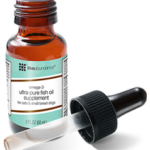Fish Oil Supplement
 Feeding your cat a high-quality diet is essential for many reasons, including maintaining health and strengthening the immune system. As with humans, research has also shown that fatty acids are crucial to a pet's diet. There are two main types of "essential fatty acids": Omega-3 and Omega-6, and they are not the same, nor do they provide the same benefits. For this article, we are only discussing Omega-3 fatty acids, including ALA (Alpha-linolenic acid), EPA (Eicosapentaenoic acid), DHA (Docosahexaenoic acid), and their particular benefits. Omega-3 belongs to a group of fatty acids known as "long-chain polyunsaturated fatty acids." Research into certain benefits of Omega-3's in humans can be contradictory and much more research is needed, however, it never hurts to try something new.
Feeding your cat a high-quality diet is essential for many reasons, including maintaining health and strengthening the immune system. As with humans, research has also shown that fatty acids are crucial to a pet's diet. There are two main types of "essential fatty acids": Omega-3 and Omega-6, and they are not the same, nor do they provide the same benefits. For this article, we are only discussing Omega-3 fatty acids, including ALA (Alpha-linolenic acid), EPA (Eicosapentaenoic acid), DHA (Docosahexaenoic acid), and their particular benefits. Omega-3 belongs to a group of fatty acids known as "long-chain polyunsaturated fatty acids." Research into certain benefits of Omega-3's in humans can be contradictory and much more research is needed, however, it never hurts to try something new.
An Omega-3 supplement may benefit a cat (or dog) in the following ways:
Allergies and Auto-Immune Issues
Arthritis
Inflammatory Diseases
Dull and Dry Hair / Coats
Yeast Infections
Skin Conditions
Eyes
Heart Problems
Cancers
Plasma Triglycerides and Cholesterol
Risks and Side Effects
There seem to be very few side effects of fatty acid supplementation. However, a rare but serious complication is pancreatitis, an inflammation of the pancreas that causes pain, diarrhea, vomiting, and dehydration. (This could be due to abruptly adding a supplement to the pet's diet—just as with any food change, adding something new should be done over a few weeks, little by little, to avoid gastric upset.)
Essential fatty acids are polyunsaturated fats. They can add calories, so watch your pet's weight. A bit less food and fewer treats may be needed to offset the calories in a fatty acid supplement. Occasionally, a pet may develop diarrhea from adding a supplement (as with any sudden change in a pet's diet). Therefore, a supplement should be started at a low dose and gradually increased to the therapeutic dose to help alleviate this problem.
Why Does Purity Matter in Fish Oil?
IFOS and “5-Star Rating” Definitions
Conclusion
 A complete and balanced diet is indispensable for optimal health and a robust immune system. However, just like us, our pets can suffer from health issues (ranging from dry skin to cancers). Adding a Fish Oil Supplement to a cat's diet may help support your pet's healthy skin, coat, heart, brain, eyes, and joints. We use and recommend Life's Abundance Pet Fish Oil, which has an IFOS 5-star rating for purity, concentration, and freshness.
A complete and balanced diet is indispensable for optimal health and a robust immune system. However, just like us, our pets can suffer from health issues (ranging from dry skin to cancers). Adding a Fish Oil Supplement to a cat's diet may help support your pet's healthy skin, coat, heart, brain, eyes, and joints. We use and recommend Life's Abundance Pet Fish Oil, which has an IFOS 5-star rating for purity, concentration, and freshness.